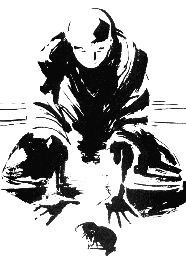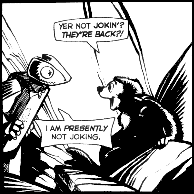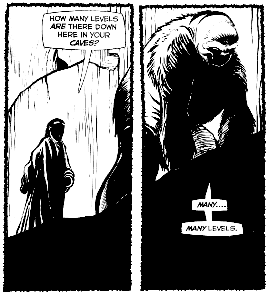Soulwind

![]() What a refreshing surprise!
What a refreshing surprise!
OK, it’s not entirely surprising to see a book like this from Image. They’ve had The Maxx for years, and since Groo and Bone passed through, there’s been lots of inventive, interesting stuff showing up with the ![]() logo on the cover. But this is something I would have been surprised by no matter who published it.
logo on the cover. But this is something I would have been surprised by no matter who published it.
 A large part of the surprise at the contents of this book comes from a sudden change of stylistic gears in the middle of the story. Writer/artist C.Scott Morse begins using a incredibly minimal style that’s as smoothly-flowing as it is stark. We are reading (we think) a story about a boy in a monastery of some kind, who muses to himself about the monks’ disfavour with the idea of “having” things.
A large part of the surprise at the contents of this book comes from a sudden change of stylistic gears in the middle of the story. Writer/artist C.Scott Morse begins using a incredibly minimal style that’s as smoothly-flowing as it is stark. We are reading (we think) a story about a boy in a monastery of some kind, who muses to himself about the monks’ disfavour with the idea of “having” things.
 Suddenly, we find ourselves somewhere altogether different. The art is sharp and fairly detailed. We are in a world where cartoony little primates with a robot negotiate with Roswell-style aliens, where ape-like hulks roam huge trees, where a traitor is being left in the wilderness to die, where masked creatures pursue a mysterious singular mission. A rich, complex world where any number of wondrous… and perhaps dangerous… things might happen.
Suddenly, we find ourselves somewhere altogether different. The art is sharp and fairly detailed. We are in a world where cartoony little primates with a robot negotiate with Roswell-style aliens, where ape-like hulks roam huge trees, where a traitor is being left in the wilderness to die, where masked creatures pursue a mysterious singular mission. A rich, complex world where any number of wondrous… and perhaps dangerous… things might happen.
I’ve heard this series likened to Bone, and I can see where the comparison comes from. Both are otherworldly fantasies with both endearing and threatening elements. Morse uses a sometimes-moody, cinematic approach that’s reminiscent of Jeff Smith’s work. (Morse’s background in animation is evident here.) They both make effective use of light and dark, and page layout to set the tone and pace of a scene. The sense of a true innocent wandering into great conflict is similar.
 But the popular reference I see the most strongly is Star Wars. Reading this story, I got the same feeling I got 20 years ago, watching the unveiling of a strangely-populated universe filled with wookies, jawas, sand people, mysterious Jedis, ideosyncratic droids, and… an unlikely hero with a destiny. Cool!
But the popular reference I see the most strongly is Star Wars. Reading this story, I got the same feeling I got 20 years ago, watching the unveiling of a strangely-populated universe filled with wookies, jawas, sand people, mysterious Jedis, ideosyncratic droids, and… an unlikely hero with a destiny. Cool!
If these comparisons give you the impression that this is just a rehash of a bunch of ideas that have been used before… I suppose there’s some of that, but it’s done so very well that it seems quite fresh. One other caveat I’d offer is that some (but not many) of the wordless sequences can be a little difficult to follow what’s happening. But “it makes you slow down and examine the pictures” is praising with faint damnation. And when Morse shines, the scenes work wonderfully well. He can create a level of dramatic tension that it seems only a cinematographer can. And anybody who can have a character urinate without the scene devolving into either cheap adolescent bathroom humour or mature-readers noir realism is a great storyteller in my book. {grin}
